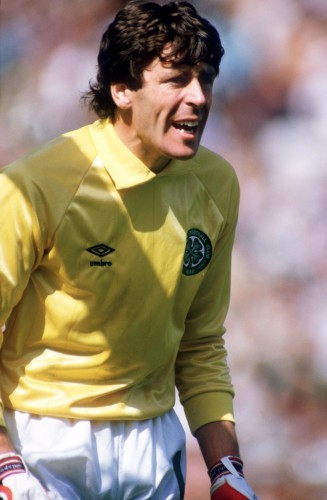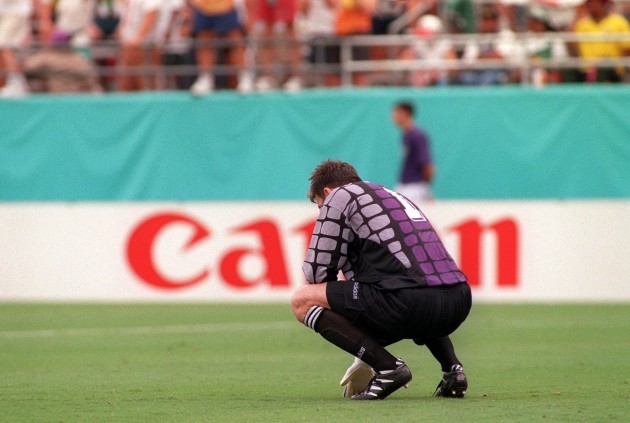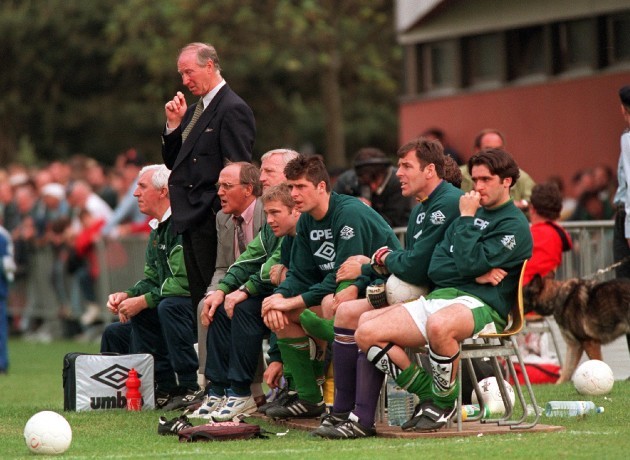‘THE BIG MAN from Donegal’ was always a reluctant hero.
You needed to simply glance at the considerable recent coverage in the Irish media devoted to the 25th anniversary of Italia 90 to get an indication of how this once-in-a-lifetime event remains irrevocably etched in the nation’s consciousness, long after the dust has settled on Jack Charlton’s reign and the feel-good factor associated with Irish football has diminished.
Now 55, Packie Bonner was an iconic figure from that glorious late 80s/early 90s era that saw the fruition of the golden age of football on these shores. His penalty save, coupled with David O’Leary’s winning spot kick, has been repeated more times than The Simpsons on Irish television.
“I had no idea,” Bonner tells The42 when asked whether he realised the save would still resonate with so many people over a quarter of a century later. “I went out to play a game. I went out to do my best for my country. I didn’t really think it was going to go to penalties. We had prepared for it. But I didn’t think it would have such a huge impact.
“To live through that period, I think emotionally, everyone was affected by it, and that to me is unique. But I had no idea it was going to be that way.”
Yet Bonner was hardly a natural star. There was and is something incredibly Irish about his intrinsic modesty and his refusal to ever bask in the glory of this iconic moment.
The natural shyness of this self-confessed introvert extends to this day and typically, while he has finally relented and capitalised on his fame by releasing an autobiography, the decision to go down this route was by no means a straightforward one. After all, it’s been 17 years since he hung up his boots, and yet only now does he feel comfortable telling his story, The Last Line, to the public.
“I had no real plans to write a book,” he says. “[Ghostwriter Gerry McDade and I] wrote a couple of chapters. I liked the feel of it. I liked the way he was talking. We wanted a story, a bit of humour. I obviously have to be honest about what happened at certain times. I wanted that storyline to be true to where I came from and where I ended up and the people I impacted on my journey.
“So I thought, if ever I’m going to do it, I’ll do it now. It’s 25 years since the penalty save and all of that.”
McDade, a long-time friend of Bonner, echoes these sentiments, explaining what drew him to the project.
“I did pester Packie for two years,” he laughs. “I felt he’s that last link between the Stein Celtic and the modern Celtic. And on top of all that, you’ve got the unique Irish experience with Jack Charlton. And there’s hidden layers to this guy as well. People need to know what he was like growing up and all that.
“So we wanted to make it less a football autobiography and more a travelogue, a journey, about a guy that came from the West Coast of Donegal. How he had great success during his career and how he dealt with those issues. Where he ended up and what the future holds.”
For Bonner, the act of writing the book was both novel and painstaking to a degree.
“I enjoyed the journey of looking back and reminiscing on how it happened, especially my younger days and where I am now,” he says. “I reflected on how certain things happened that were out of my control but were also the making of me.
“Without taking on those challenges, opportunities don’t arise also. You have to deal with the challenges — going away from home, leaving a twin brother, going from a country background to a city background, going to a big club like Celtic where you have to stand up for yourself or you get lost very quickly…
“It was enjoyable, but it was stressful at times also, because you’re trying to write it in a way that I wanted to write it without upsetting anybody. It only takes a word or a sentence and someone can construe it wrongly. I hope they haven’t. I hope they look at it and say that’s my side of events. Maybe they have a different outlook, which is fine.”
McDade also supports the idea that they wanted to avoid the type of sensationalism that has accompanied many other ex-footballers’ autobiographies in the past.
“We made it very clear the shape and the content and the kind of book we wanted to write. We almost saw it as a novel — there’s a great story here, let’s focus on the story. There are interesting aspects of Packie’s life as well politically. And as Packie says, words can be misconstrued, so we had to go through it with a fine tooth comb.
“I’ve got to know him and people ask me what’s he like. I say he’s exactly as I thought — he’s a man of integrity, a gentleman. The book was never going to be a hagiography of people. It was never going to be a character assassination of people. That’s not his style, and if we’d written a book like that, a lot of people would be surprised and very disappointed, because that’s not the Packie Bonner we expect. He’s no interest in character assassination.
“Packie’s career is a fairytale. He made his Celtic debut on St Patrick’s Day. His Irish debut was on his 21st birthday. Even the day Lou Macari freed him from Celtic was the anniversary of the day he signed for Celtic with Jock Stein. So there were all these touchstones that brought a romance to this story. And what’s football without romance?”
So while the book is unlikely to generate the kind of explosive headlines that certain others tend to provoke, that it is not to suggest that The Last Line is uninteresting. Some of the most fascinating aspects of the book give the reader an insight into Bonner’s psyche, and his struggles at times to deal with the expectations of an entire nation on his shoulders.
In the book, he cites the days and hours leading up to the 1994 World Cup, in particular, as intensely nerve-ridden from his perspective.
“[In the book] I talk about me being an introvert — that’s how I came out in all the studies I’ve done. When they talked to me about it, it summed me up to a tee. You can do all the preparation, you can train yourself, but as soon as that massive stress hits, you will always revert back to type. And that’s probably why I was so nervous.
“The conditions around me and the lack of mental preparation in the training ground because we couldn’t train and having to do it again all over. I was 34 years old at that stage and you’d expect me to be in a different place, but I have to tell it as it was.
“I needed a psychologist at that time and I think there’s a place for them [in football]. You can go over the top with it. But you need someone who can talk to you and mentor you in the right manner. Whether it’s a psychologist or a good friend or somebody who knows you inside out. Somebody who knows how you tick and is there for you — for me, that was crucial.
“The other difference between 1994 and 1990 was that (former Ireland goalkeeper) Gerry Peyton was no longer there. Gerry would have been that kind of guy that you could talk to. Not taking anything away from Alan [Kelly]. He’s a really good tutor now, but he was a younger guy coming in, starting his career. If he was in the team, I would have done what Gerry did for me.
“Roles were reversed and you missed Gerry from that perspective. When you room with somebody for six weeks in a World Cup, you have to build up a relationship. That relationship is about more than just being out on the pitch training. So I did miss Gerry for a period.”
Interestingly though, Bonner was less apprehensive about playing in the now-infamous 1994 World Cup qualifier with Northern Ireland at Windsor Park. Former teammate Alan McLoughlin, in particular, has vividly recounted the level of intimidation that the team were subjected to. But, as a veteran of Old Firm derbies, this hate-filled atmosphere was less unique for Bonner than it would have been for some of the squad’s more inexperienced members.
“We knew we were going into a hostile atmosphere. I had the experience of Celtic-Rangers games. Windsor Park was closer in. It was fairly strong. But I didn’t have fear about going into the lions’ den. ‘Bring it on’ was my attitude whenever I went to Ibrox.
“We knew they were motivated and up for it. That was the only pressure I felt from it. Apart from that and all the surrounding stuff, I was used to it, but maybe others weren’t.”
Yet while the Boys in Green were successful in the North that night, the 94 World Cup — strange as it may seem looking back in the context of the current success-starved era — felt somewhat anti-climactic in comparison to the heady heights of Italia 90.
For Bonner, in particular, the tournament in America ended on a sour note, as he failed to grasp an innocuous-looking Wim Jonk shot. The error consigned Ireland to a 2-0 loss to the Netherlands, and a last-16 exit from a tournament that had begun, so promisingly, with the 1-0 defeat of eventual finalists Italy.
“In life, you make mistakes… If you can minimise your mistakes down to one or two, then you’ve done well. It’s about not making the same mistake every single time. It’s a learning moment. If I was living again, I would hope that wouldn’t happen, but I’d have approached that whole tournament slightly differently. It’s nice to reflect back on things and to use them as a learning moment. You don’t go out intentionally to make mistakes.
“You have to put something in place that gets rid of [bad memories] and adds something more positive. So that’s what I’ve learned since I retired.”
Aged 34 at the time of the Jonk gaffe, Bonner had been a loyal and invaluable servant to Irish football and so inevitably, he had plenty of sympathisers. Nevertheless, the former Celtic goalkeeper was taken aback, when RTÉ pundit and journalist Eamon Dunphy — a scathing critic of Jack Charlton and the style of football employed by the team — gave him a friendly kiss on the cheek after the game.
“I think there’s a good side to Eamon. I think that’s been a facade really that he has to come on and talk. He’s made a living of getting in there and saying things that have garnered a bit of attention.
“He showed on that day that he was sympathetic to what happened… He didn’t really say anything. And that was good. It was a big moment for me because it was a difficult time and when you have one of your fellow professionals doing that, it’s nice.”
The aftermath of that tournament is widely considered to be the beginning of the end for Jack Charlton’s team and Bonner admits his former manager probably stayed two years too long in the job.
“It needed a change,” he explains. “At that stage, I was 36 years old. I was on the bench. Alan (Kelly) was playing. Ray (Houghton) was still playing, as was Paul (McGrath) and John Aldridge. We were all at an age where we shouldn’t have been playing international football. We were very lucky. There was a group of young players coming through — the Damien Duffs, the Robbie Keanes, the Richard Dunnes.”
Bonner also rejects suggestions made in certain quarters (most notably Roy Keane’s first autobiography) that a lack of professionalism significantly hampered the progress of Charlton’s side towards the end of his reign.
“We never drank before games. We drank like every other group of players in between (games). The foreign players now don’t drink — that’s their culture.
“We drank at the right times, we enjoyed ourselves together. I think that was the build-up of team spirit. It wasn’t down to that against Austria (when they were beaten 3-1 in a Euro 96 qualifier in Dublin). It was more down to the team not being what it was a couple of years previously. I think it was time to move on.”
Bonner was also part of the coaching staff at the 2002 World Cup and observed the notorious pre-tournament fallout between Roy Keane and Mick McCarthy at close quarters. And while many have speculated that the team could have gone even further with Keane in the side, Bonner suggests that this much-discussed controversy actually “galvanised” them.
“It’s easy to talk about what would have happened if Roy was there. One thing’s for sure — the guys really did pull together. They were a penalty shootout away from doing what we did (in Italia 90). And we were treated as heroes. They were almost treated as villains to a point, which is a shame. They should have been given more recognition for what they achieved.”
Bonner also acknowledges that he was unhappy with Keane returning to the international set-up and seriously considered resigning from his job in the coaching team in protest.
“I wanted to let Roy know how I felt and the squad felt, but we never had that opportunity,” Bonner adds. “Brian Kerr took the job and invited him back. It wasn’t Brian’s problem. He wanted his best players there.
“I needed to have that chat with Roy and it didn’t happen. And we haven’t had that chat since. There was always the intention that we would sit and talk. He came in (to the squad) and then left very quickly, and that’s why it didn’t happen. There was always the intention that we would sit and talk.”
Bonner left his role in Ireland’s coaching set-up following Steve Staunton’s appointment as manager in 2006 and has since taking up his current role as a technical instructor for Uefa, but says there are certain elements of playing the game that he misses.
“Of course, I miss being involved in one way. But I do a lot of work with Uefa, travelling around Europe. I’m still involved in the coaching and education side. I love travelling around with adults who want to learn. I do the football with BBC and Sky and I get out to the games. I would like to do a little bit more. Stepping away as a coach, that’s the hardest part, because that’s the enjoyable bit.
“(I miss the) banter and relationships and friendships. Day to day, you do different things, and I’m juggling things around. You like to have a bit of consistency. When you get up in the morning, you can go in your car and end up on automatic pilot and end up outside the training ground. Then you go to train. Your focus is on working with players and getting the best out of them. That’s what I enjoy.”
Packie Bonner will be signing copies of his new book at Eason O’Connell Street, Dublin at 12pm today.
‘The Last Line’ is published by Ebury Press. More info here.




